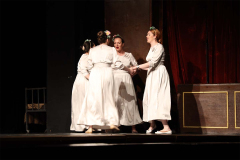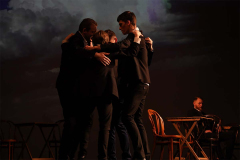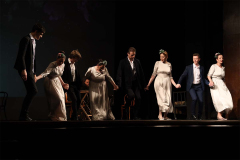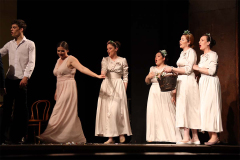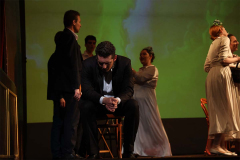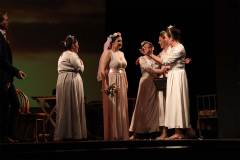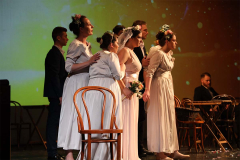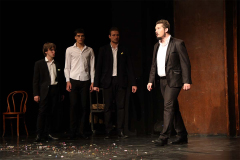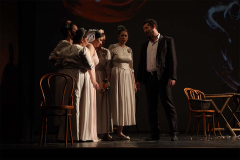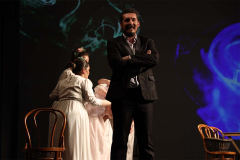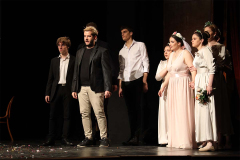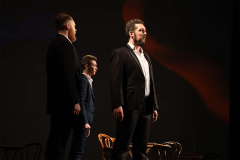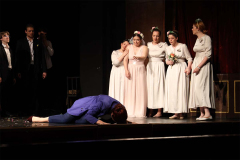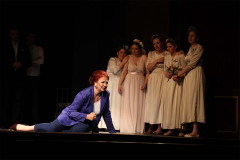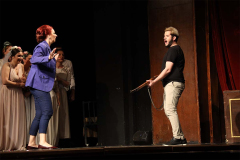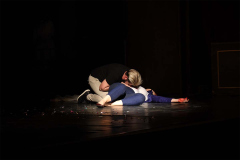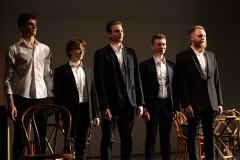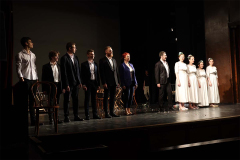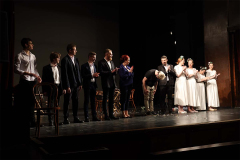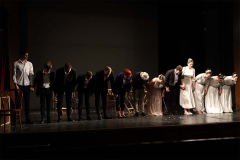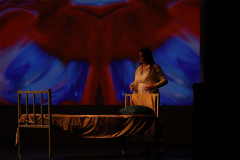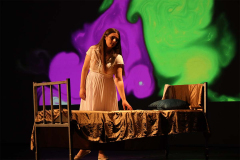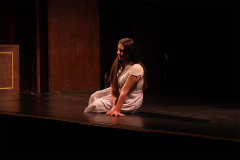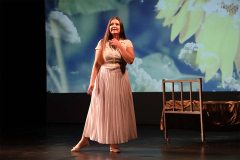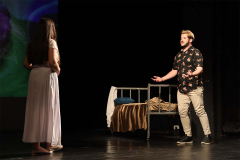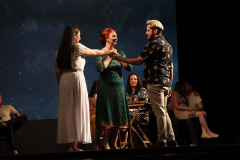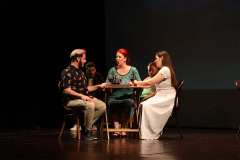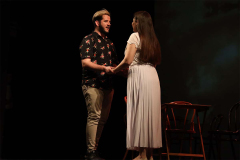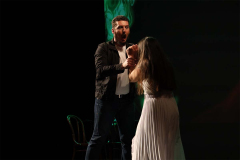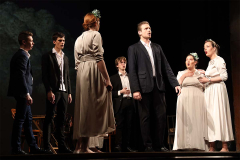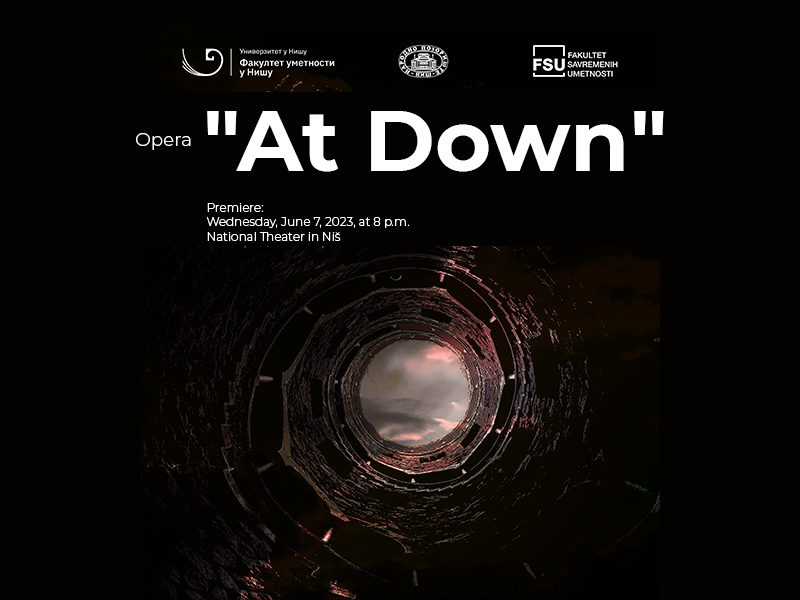
PREMIERE OF THE OPERA “AT DAWN” AT THE NATIONAL THEATER IN NIŠ
Andjela Petrovic / / News / 2. 06. 2023.
The premiere performance of Stanislav Binički’s opera “At Dawn” took place at the National Theater in Niš on June 7, 2023, starting at 8 p.m. This significant cultural and educational event is the doctoral artistic project of our doctoral candidate Jovana Solunović-Mitrović, conducted in cooperation with the Faculty of Contemporary Arts, the Faculty of Arts of the University of Niš, and the National Theater in Niš. The project was mentored by Prof. Božidar Đurović, and co-mentored by Prof. Dr. Nataša Nagorni-Petrov.
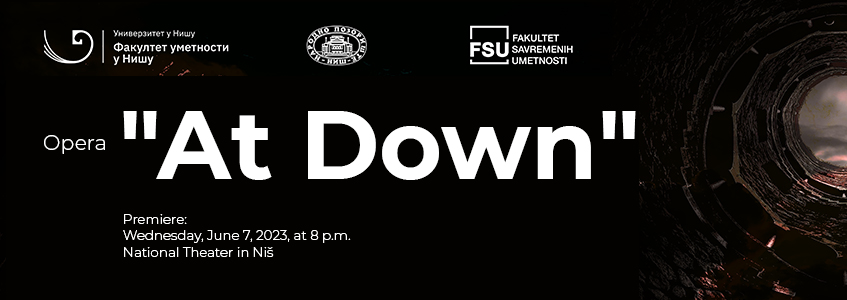
The roles in the opera “At Dawn” were performed by:
- Katarina Mihailović (Stanka) – soprano;
- Aleksandra Ristić (Anđa) – mezzo-soprano;
- Damjan Mišić (Rade) – tenor;
- Marko Milisavljević (Redžep) – baritone.
The committee consisted of:
- Vida Ognjenović, Professor Emeritus, Faculty of Contemporary Arts;
- Ljubiša Jovanović, Full Professor, Faculty of Music, University of Arts;
- Prof. Dr. Nataša Nagorni-Petrov;
- Prof. Dr. Danijela Stojanović;
- Božidar Đurović, Full Professor, Faculty of Contemporary Arts (mentor).
PROJECT OF DIGITALIZATION OF SMALL OPERA FORMS – DOCTORAL ARTISTIC PROJECT OF JOVANA SOLUNOVIĆ-MITROVIĆ
The project of digitalization of small opera forms is part of the research within the doctoral dissertation. The aim of the project is to enable the digital distribution of smaller operas with the goal of spreading cultural heritage and making these artistic works accessible to audiences worldwide.
In today’s digital age, technological progress plays a crucial role in shaping our experience and access to art. One area of art facing the challenges and needs of contemporary audiences is opera. Traditionally, opera is a complex and grandiose performance form that has often been presented within the framework of elitism. However, with technological advancements and digitalization, the opportunity arises for opera to become more accessible and appealing to a wider audience.
The project of digitalization of small opera forms represents a natural step in the evolution of this artistic form. Through the process of digitalization, opera arrangements can be transformed into sounds that are closer to contemporary audiences. In this way, opera can be brought closer to new generations and a broader audience who may not have had the opportunity to experience this type of art in a traditional manner.
The goal of the project of digitalization of small opera forms is to merge traditional opera art with modern technology and meet the expectations of the audience. Through the digitalization of opera arrangements, a new space is created for the exchange and acquaintance with this form of art. This project contributes to the preservation of the cultural heritage of smaller operas, as well as the promotion and popularization of this genre of art.
PLOT OF THE OPERA:
The opera was created in 1903, and the story is set in a Serbian village under Turkish rule. There, love is born between Rade and Stanka. Stanka comes to the well for water, expecting Rade. He quickly arrives, and the two talk about their love and longing. Rade’s mother, Anđa, appears, blesses them, and approves their marriage. Stanka stays in the meadow, picking flowers for the upcoming wedding.
The village aga Redžep is hopelessly in love with Stanka and intends to thwart her marriage to Rade. He encounters her and implores Stanka to respond to his love. She replies that she loves Rade, so he threatens her, and she resists and runs away. The next morning, the village gathers in celebration of the young couple’s wedding. Suddenly, Redžep appears and in great anger declares that Rade is “the son of sin, the son of the whole village”. No one believes this. Anđa appears, and to everyone’s astonishment, she confesses that Rade is indeed an illegitimate child, but not a child of sin, but of love. In anger and despair, Rade draws his weapon on his mother; she suddenly dies of pain, and Redžep’s men forcibly take Stanka away.
In the digital version of this story set in the 21st century, the emphasis is on a feminist narrative and the depiction of changes in society, especially regarding the position of women and the issue of femicide. The story still takes place in a Serbian rural village but under the influence of modern social and cultural factors.
The main character Stanka faces the challenges and limitations imposed by patriarchal society. Instead of being a passive object of men’s desire, Stanka is aware of her worth, sexuality, and right to choose. Her love for Rade is not only romantic but also a symbol of the struggle for freedom and authenticity.
In this digital version, the tragedy that occurs in the story has a deeper significance. The murder of Anđa, committed by Rade, represents an explosion of deeply rooted male violence but also a turning point for Rade. Realizing the consequences of his actions, he becomes aware of his responsibility.
The digital version of this story emphasizes the importance of feminism and the change of social norms to create a more equal and just society. Portraying female courage and questioning patriarchal values serves as a stimulus for dialogue on important issues that still exist in our society.
ABOUT THE DIRECTOR:
Jovana Solunović-Mitrović was born in Niš in 1986, where she completed her primary and secondary music education. She then graduated from the Solo Singing Department at the Faculty of Arts in Niš, and completed her master’s studies in the field of art theory and media at the University of Arts in Belgrade. She continued her education in theater studies with her master’s studies in Norway, where she successfully defended a thesis on political theater and Gesamtkunstwerk in exile at the University of Bergen, mentored by eminent Scandinavian professor Knut Uve Arnsen. She perfected her dramaturgy practice at the National Theater, working on a modern version of Ibsen’s “Peer Gynt” – “Peer Gynt Dub” – directed by Tor Vagn Lid. As a theater producer, she gained experience at the Norwegian National Theater for Contemporary Dance “Carte Blanche”, where she worked on a sustainable development and ecological production project within the UN’s Green Agenda. As an educator, she has won numerous awards with her students in the fields of solo singing and dramatic arts. Jovana is a PhD student at the Faculty of Contemporary Arts in Belgrade, focusing on the study of the digitalization process of small opera forms, and Stanislav Binički’s opera “At Dawn” is her doctoral/artistic project, under the mentorship of renowned director Professor Božidar Đurović. Jovana currently lives and works in Bergen.
Take a look at the atmosphere from the premiere performance of Stanislav Binički’s opera “At Dawn“:

